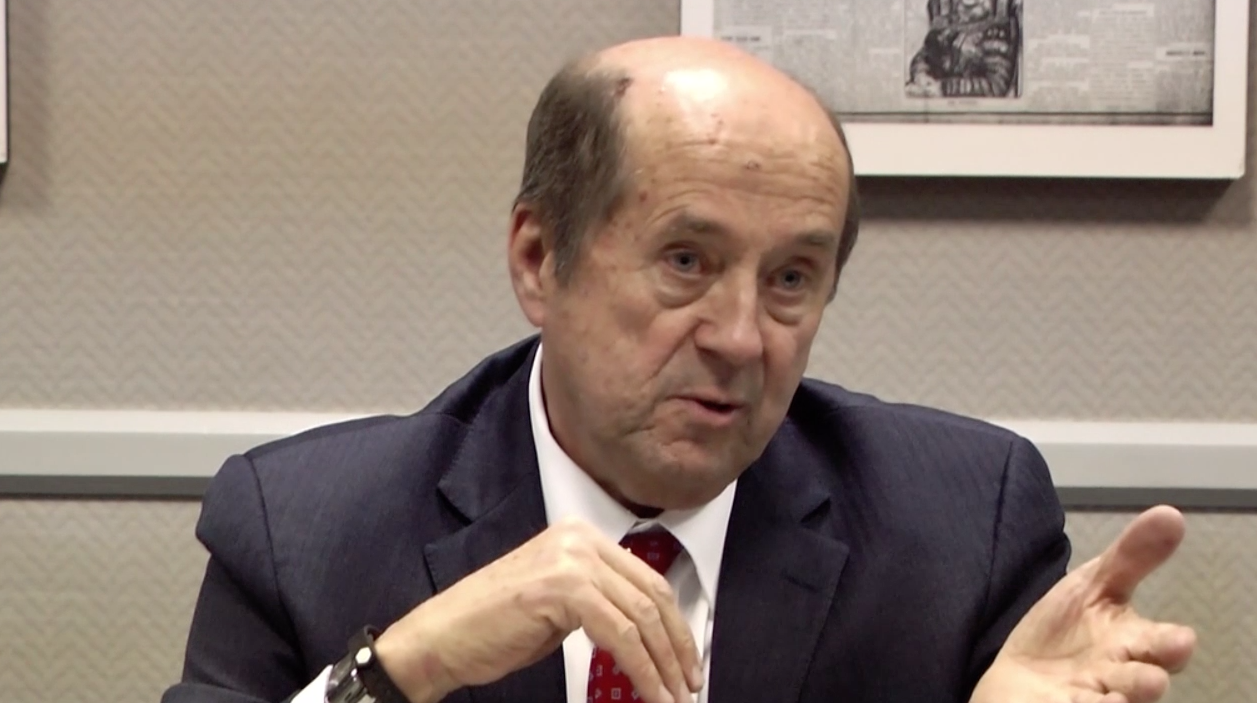Humphries stays positive about GM’s presence here

Thomas Humphries is an unabashed cheerleader for the Mahoning Valley, a role that has enabled him to succeed as the chief executive officer and president of the Youngstown/Warren Regional Chamber.
Even when confronted with the prospect of General Motors closing its Lordstown assembly complex, home of the highly rated Chevrolet Cruze, Humphries remains positive.
“Try to be a team player,” the 20-year CEO of the chamber said of the steps Valley residents can take to solidify the future of the Lordstown facility. “How do we influence them? A good community. People that work and care for one another. We have all of that here.”
Humphries shared his glass half-full assessment of GM’s presence in the region during a meeting last week with The Vindicator Editorial Board.
The wide-ranging conversation was actually an exit interview for a man who has been in the forefront of the Valley’s job-retention and job-creation efforts since 1997.
While the list of economic development projects completed during his tenure is impressive, the uncertainty over the future of auto manufacturing in the Valley continues to cast a pall over the region.
Humphries acknowledged that the lack of information from the decision makers in Detroit is cause for concern, but that isn’t necessarily a bad thing.
“I think we should be concerned, it always makes us better when we are,” the chamber’s CEO said. “It is helpless when you are not in charge.”
As Humphries sees it, a letter-writing campaign aimed at GM Chief Executive Officer Mary Barra and other executives won’t make a difference because the company’s decision about Lordstown will be based on tangible measures such as quality, profit margins, safety record and attitude of the workforce.
“If you aren’t producing a quality product with a modest net-income minimum, then you are in trouble,” Humphries said.
Top rating
What is worrisome is that the uncertainty over the future of the Lordstown plant has nothing to do with the quality of the Chevrolet Cruze – it has been rated as the best compact car in America – or the attitude of the workers.
The soft sales over the past year – the Cruze had its second worst sales month in November since it hit the national market in November 2010 – are due to a change in buyers’ demand.
The relatively low gas prices have made trucks and SUVs the vehicles of choice for an increasing number of drivers, and GM has responded by launching a hard-hitting national advertising campaign.
As a result, production of the Cruze has been greatly reduced. The automaker has eliminated the third shift at Lordstown and shut the complex down for many weeks this year.
Indeed, the plant will go silent for Christmas and also at the beginning of 2018.
Despite Humphries’ positive outlook, no news is not good news when it comes to the future of the complex.
We reiterate our plea to General Motors to give the Mahoning Valley a reason to be hopeful. After all, the company and the region have each benefited from the 51-year relationship.
But while auto manufacturing is unfinished business as Humphries departs at the end of the year, there are at least a couple of projects in the pipeline that he believes will rate as game changers.
The chamber CEO declined to provide any specifics, but he did say that the projects would result in large capital investments and a large number of jobs.
But here’s a reality Humphries’ successor, James Dignan, former commander of the Air Force Reserve Station in Vienna, and the other economic development entities in the Valley must face: There may not be a sufficient number of qualified workers who can pass the drug test to meet the needs of area employers.
There are 16,000 jobs in the private sector in Mahoning, Trumbull and Columbiana counties that need to be filled. Although education, business and labor leaders have joined forces to develop training programs, the region still has a large number of working-age residents on government assistance of some kind.
Humphries is right when he says the challenge to meet the needs of employers isn’t confined to the Valley.
Ohio Gov. John R. Kasich has bemoaned the fact there are more than 130,000 private-sector jobs in the state that need to be filled, but there aren’t enough people to fill them.
Kasich has warned that companies will take those jobs to other states if their needs aren’t met in Ohio.
 43
43
